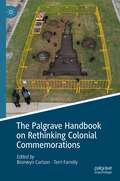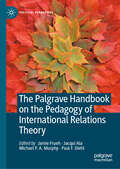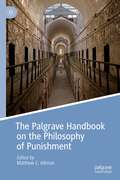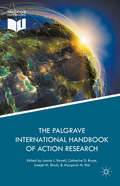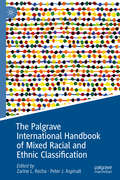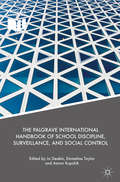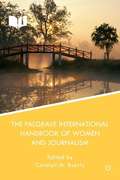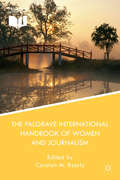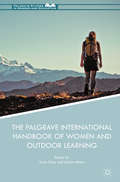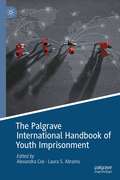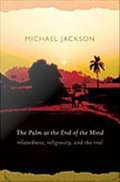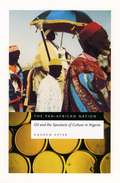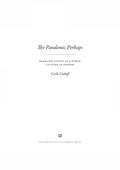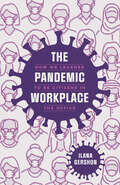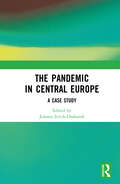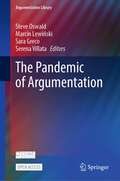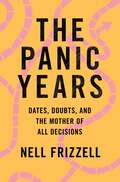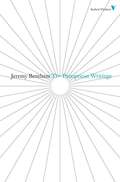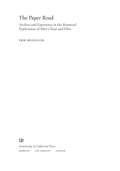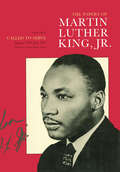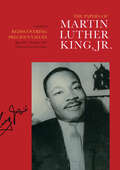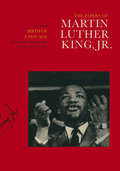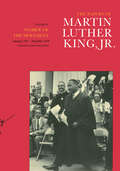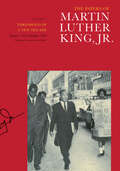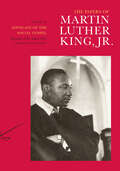- Table View
- List View
The Palgrave Handbook on Rethinking Colonial Commemorations
by Bronwyn Carlson Terri FarrellyThe Palgrave Handbook on Rethinking Colonial Commemorations explores global efforts, particularly from Indigenous and Bla(c)k communities, to dismantle colonial commemorations, monuments, and memorials. Across the world, many Indigenous and Bla(c)k communities have taken action to remove, rectify and/or re-imagine colonial commemorations. These efforts have had the support of some non-Indigenous and white community members, but very often they have faced fierce opposition. In spite of this, many have succeeded, and this work aims to acknowledge and honour these efforts. As a current and much-debated issue, this book will present fresh findings and analyses of recent and historical events, including #RhodesMustFall, Anzac Day protests, and the transferral of confederate monuments to museums. Comprising of chapters written by Indigenous, Bla(c)k and non-Indigenous authors, from a wide variety of locations, backgrounds and purposes, this topical volume is a timely and important contribution to the fields of memory studies, Indigenous Studies, and cultural heritage.
The Palgrave Handbook on the Pedagogy of International Relations Theory (Political Pedagogies)
by Paul F. Diehl Jamie Frueh Michael P. A. Murphy Jacqui AlaThe Palgrave Handbook on the Pedagogy of International Relations Theory is a collection that explores how best to teach the systems of thought that organize the study of international relations and global politics. All chapters document and advance intradisciplinary conversations about the challenge of helping students understand the nuances of IR theory. Authors document strategies they have successfully applied to that challenge in a variety of contexts and encourage readers to creatively adapt to the challenges of their own pedagogical contexts. The handbook is organized around four themes – teaching theory for particular audiences and classroom contexts, tips for teaching specific theories, an exploration of pedagogical approaches to teaching theory, and pedagogical considerations specific to courses in geographic regions.
The Palgrave Handbook on the Philosophy of Punishment (Palgrave Handbooks in the Philosophy of Law)
by Matthew C. AltmanThis Handbook provides a comprehensive survey of major topics in the philosophy of punishment from many of the field’s leading scholars. Key featuresPresents a history of punishment theory from ancient times to the present.Evaluates the main proposed justifications of punishment, including retributivism, general and specific deterrence theories, mixed theories, expressivism, societal-defense theory, fair play theory, rights forfeiture theory, and the public health-quarantine model.Discusses sentencing, proportionality, policing, prosecution, and the role punishment plays in the context of the state.Examines advances in neuroscience and debates about whether free will skepticism undermines the justifiability of punishment.Considers forgiveness, restorative justice, and calls to abolish punishment.Addresses pressing social issues such as mass incarceration, juvenile justice, punitive torture, the death penalty, and “cruel and unusual” punishment. · With its unmatched breadth and depth, this book is essential reading for scholars who want to keep abreast of the field and for advanced students wishing to explore the frontiers of the subject.
The Palgrave International Handbook of Action Research
by Lonnie L. Rowell Catherine D. Bruce Joseph M. Shosh Margaret M. RielThe Palgrave International Handbook of Action Research offers a vivid portrait of both theoretical perspectives and practical action research activity and related benefits around the globe, while attending to the cultural, political, social, historical and ecological contexts that localize, shape and characterize action research. Consisting of teachers, youth workers, counselors, nurses, community developers, artists, ecologists, farmers, settlement-dwellers, students, professors and intellectual-activists on every continent and at every edge of the globe, the movement sustained and inspired by this community was born of the efforts of intellectual-activists in the mid-twentieth century specifically: Orlando Fals Borda, Paulo Freire, Myles Horton, Kurt Lewin. Cross-national issues of networking, as well as the challenges, tensions, and issues associated with the transformative power of action research are explored from multiple perspectives providing unique contributions to our understanding of what it means to do action research and to be an action researcher. This handbook sets a global action research agenda and map for readers to consider as they embark on new projects.
The Palgrave International Handbook of Mixed Racial and Ethnic Classification
by Peter J. Aspinall Zarine L. RochaThis handbook provides a global study of the classification of mixed race and ethnicity at the state level, bringing together a diverse range of country case studies from around the world. The classification of race and ethnicity by the state is a common way to organize and make sense of populations in many countries, from the national census and birth and death records, to identity cards and household surveys. As populations have grown, diversified, and become increasingly transnational and mobile, single and mutually exclusive categories struggle to adequately capture the complexity of identities and heritages in multicultural societies. State motivations for classification vary widely, and have shifted over time, ranging from subjugation and exclusion to remediation and addressing inequalities. The chapters in this handbook illustrate how differing histories and contemporary realities have led states to count and classify mixedness in different ways, for different reasons. This collection will serve as a key reference point on the international classification of mixed race and ethnicity for students and scholars across sociology, ethnic and racial studies, and public policy, as well as policy makers and practitioners.
The Palgrave International Handbook of School Discipline, Surveillance, and Social Control
by Aaron Kupchik Emmeline Taylor Jo DeakinTruly international in scope, this Handbook focuses on approaches to discipline, surveillance and social control from around the world, critically examining the strategies and practices schools employ to monitor students and control their behavior. Bringing together leading scholars from a range of disciplinary backgrounds, the chapters scrutinize, analyze and compare schools' practices across the globe, providing a critical review of existing evidence, debates and understandings, while looking forward to address emerging important questions and key policy issues. The chapters are divided into four sections. Part 1 offers accounts of international trends in school discipline, surveillance and punishment; Part 2 examines the merging of school strategies with criminal justice practices; Part 3 focuses on developments in school technological surveillance; and Part 4 concludes by discussing restorative and balanced approaches to school discipline and behavior management. As the first Handbook to draw together these multiple themes into one text, and the first international comparative collection on school discipline, surveillance and social control, it will appeal to scholars across a range of fields including sociology, education, criminology, critical security studies and psychology, providing a unique, timely, and indispensable resource for undergraduate educators and researchers.
The Palgrave International Handbook of Women and Journalism
by Carolyn M. ByerlyThis handbook is a timely academic adaptation of information contained in the Global Report on the Status of Women in News Media, a study commissioned by the International Women's Media Foundation and published in 2011. The study was conducted by the book's editor, international feminist media scholar, Carolyn M. Byerly. The text draws together the most robust data from that study, presenting it in 29 chapters on individual nations and three additional chapters with historical background on women in journalism and a theoretical framework grounded in feminist political economy. The book is the most expansive effort to date to consider women's standing in the journalism profession across the world. The contributing authors, in most cases the original researchers for their respective nations in the Global Report study, seek to question the status of women in newsrooms, asking how far women have come and what their progress (or lack of progress) tells us about women's right to communicate.
The Palgrave International Handbook of Women and Journalism
by Carolyn M. ByerlyNow in paperback for the first time, the Handbook is an academic adaptation of information contained in the Global Report on the Status of Women in News Media, a study commissioned by the International Women's Media Foundation. The book's editor was the principal investigator of the original study. This text draws together the most robust data from that original study, presenting it in 29 chapters on individual nations and three additional theoretical chapters. The book is the most expansive effort to date to consider women's standing in the journalism profession across the world. Contents organize nations in relation to their progress within newsrooms, with those most advanced in gender equality representing diversity in terms of region and national development. Contributing authors are, in most cases, the original researchers for their respective nations in the Global Report study.
The Palgrave International Handbook of Women and Outdoor Learning
by Denise Mitten Tonia GrayThis Handbook serves as a starting point for critical analysis and discourse about the status of women in outdoor learning environments (OLEs). Women choose to participate actively in outdoors careers, many believing the profession is a level playing field and that it offers alternatives to traditional sporting activities. They enter outdoor learning primarily on the strength of their enthusiasm for leading and teaching in natural environments and assume the field is inclusive, rewarding excellence regardless of age, gender, socioeconomic status, disability, or ethnicity. However, both research and collective experiences in OLEs suggest that many women feel invisible, relegated, marginalized, and undervalued. In response to this marginalization, this Handbook celebrates the richness of knowledge and practices of women practitioners in OLEs. Women scholars and practitioners from numerous fields, such as experiential outdoor education, adventure education, adventure therapy, and gender studies, explore the implications of their research and practice using poignant examples within their own disciplines. These insights emerge from similar life experiences as women and outdoor leaders in the 1970s to the present. Social inequalities still abound in OLEs, and the Handbook ensures that the contributions of women are highlighted as well as the work that needs to be done to make these spaces inclusive.Global in perspective and capacious in content, this one-stop volume is an indispensable reference resource for a diverse range of academics, including students and researchers in the fields of education, psychology, sociology, gender studies, geography, and environment studies, as well as the many outdoors fields.
The Palgrave International Handbook of Youth Imprisonment (Palgrave Studies in Prisons and Penology)
by Laura S. Abrams Alexandra CoxThis handbook brings together the knowledge on juvenile imprisonment to develop a global, synthesized view of the impact of imprisonment on children and young people. There are a growing number of scholars around the world who have conducted in-depth, qualitative research inside of youth prisons, and about young people incarcerated in adult prisons, and yet this research has never been synthesized or compiled. This book is organized around several core themes including: conditions of confinement, relationships in confinement, gender/sexuality and identity, perspectives on juvenile facility staff, reentry from youth prisons, young people’s experiences in adult prisons, and new models and perspectives on juvenile imprisonment. This handbook seeks to educate students, scholars, and policymakers about the role of incarceration in young people’s lives, from an empirically-informed, critical, and global perspective.
The Palm at the End of the Mind: Relatedness, Religiosity, and the Real
by Michael JacksonIn many societies and for many people, religiosity is only incidentally connected with texts or theologies, church or mosque, temple or monastery. Drawing on a lifetime of ethnographic work among people for whom religion is not principally a matter of faith, doctrine, or definition, Michael Jackson turns his attention to those situations in life where we come up against the limits of language, our strength, and our knowledge, yet are sometimes thrown open to new ways of understanding our being-in-the-world, to new ways of connecting with others. Through sixty-one beautifully crafted essays based on sojourns in Europe, West Africa, the United States, Australia, and New Zealand, and taking his cue from Wallace Stevens's late poem, "Of Mere Being," Jackson explores a range of experiences where "the palm at the end of the mind" stands "beyond thought," on "the edge of space," "a foreign song. " Moments of crisis as well as everyday experiences in cafs, airports, and offices disclose the subtle ways in which a single life shades into others, the boundaries between cultures become blurred, fate unfolds through genealogical time, elective affinities make their appearance, and different values contend.
The Pan-African Nation: Oil and the Spectacle of Culture in Nigeria
by Andrew ApterWhen Nigeria hosted the Second World Black and African Festival of Arts and Culture (FESTAC) in 1977, it celebrated a global vision of black nationhood and citizenship animated by the exuberance of its recent oil boom. Andrew Apter's The Pan-African Nation tells the full story of this cultural extravaganza, from Nigeria's spectacular rebirth as a rapidly developing petro-state to its dramatic demise when the boom went bust. According to Apter, FESTAC expanded the horizons of blackness in Nigeria to mirror the global circuits of its economy. By showcasing masks, dances, images, and souvenirs from its many diverse ethnic groups, Nigeria forged a new national culture. In the grandeur of this oil-fed confidence, the nation subsumed all black and African cultures within its empire of cultural signs and erased its colonial legacies from collective memory. As the oil economy collapsed, however, cultural signs became unstable, contributing to rampant violence and dissimulation. The Pan-African Nation unpacks FESTAC as a historically situated mirror of production in Nigeria. More broadly, it points towards a critique of the political economy of the sign in postcolonial Africa.
The Pandemic Perhaps
by Carlo CaduffIn 2005, American experts sent out urgent warnings throughout the country: a devastating flu pandemic was fast approaching. Influenza was a serious disease, not a seasonal nuisance; it could kill millions of people. If urgent steps were not taken immediately, the pandemic could shut down the economy and "trigger a reaction that will change the world overnight." The Pandemic Perhaps explores how American experts framed a catastrophe that never occurred. The urgent threat that was presented to the public produced a profound sense of insecurity, prompting a systematic effort to prepare the population for the coming plague. But when that plague did not arrive, the race to avert it carried on. Paradoxically, it was the absence of disease that made preparedness a permanent project.The Pandemic Perhaps tells the story of what happened when nothing really happened. Drawing on fieldwork among scientists and public health professionals in New York City, the book is an investigation of how actors and institutions produced a scene of extreme expectation through the circulation of dramatic plague visions. It argues that experts deployed these visions to draw attention to the possibility of a pandemic, frame the disease as a catastrophic event, and make it meaningful to the nation. Today, when we talk about pandemic influenza, we must always say "perhaps." What, then, does it mean to engage a disease in the modality of the maybe?
The Pandemic Workplace: How We Learned to Be Citizens in the Office
by Ilana GershonA provocative book arguing that the workplace is where we learn to live democratically. In The Pandemic Workplace, anthropologist Ilana Gershon turns her attention to the US workplace and how it changed—and changed us—during the pandemic. She argues that the unprecedented organizational challenges of the pandemic forced us to radically reexamine our attitudes about work and to think more deeply about how values clash in the workplace. These changes also led us as workers to engage more with the contracts that bind us as we rethought when and how we allow others to tell us what to do. Based on over two hundred interviews, Gershon’s book reveals how negotiating these tensions during the pandemic made the workplace into a laboratory for democratic living—the key place where Americans are learning how to develop effective political strategies and think about the common good. Exploring the explicit and unspoken ways we are governed (and govern others) at work, this accessible book shows how the workplace teaches us to be democratic citizens.
The Pandemic in Central Europe: A Case Study
by Jolanta Itrich-DrabarekThis book studies the different models adopted by contemporary states in Central Europe in fighting the SARS-CoV-2 virus. With thorough analysis of different results and impacts of governmental policies, the authors examine the direction of the global economy after the pandemic ends. The volume: Analyzes the risks and effectiveness of the policy strategies taken by political regimes within states of central Europe; Probes into the changes in the functioning of post-pandemic society, especially the limitations of human rights due to state coercion and corruption risks; Understands issues related to the law-making process, healthcare policy, digitisation of state institutions and key processes carried out by entities of the system of public authority, and the establishment of principles and mechanisms of cooperation between the state and the business environment; Distinguishes the approaches of central and local administrations and of public authorities and citizens to the pandemic phenomenon; Assesses the actions taken by NATO and the national armed forces in the fight against the COVID-19 pandemic, with particular emphasis on the situation in the Visegrad Group countries. A timely study, this will be of great interest to scholars and researchers of political theory, sociology, public health and social care, governance, public policy, security studies and public administration.
The Pandemic of Argumentation (Argumentation Library #43)
by Serena Villata Steve Oswald Sara Greco Marcin LewińskiThis open access book addresses communicative aspects of the current COVID-19 pandemic as well as the epidemic of misinformation from the perspective of argumentation theory. Argumentation theory is uniquely placed to understand and account for the challenges of public reason as expressed through argumentative discourse. The book thus focuses on the extent to which the forms, norms and functions of public argumentation have changed in the face of the COVID-19 pandemic. This question is investigated along the three main research lines of the COST Action project CA 17132: European network for Argumentation and Public PoLicY analysis (APPLY): descriptive, normative, and prescriptive. The volume offers a broad range of contributions which treat argumentative phenomena that are directly related to the changes in public discourse in the wake of the outburst of COVID-19. The volume additionally places particular emphasis on expert argumentation, given (i) the importance expert discourse has had over the last two years, and (ii) the challenges that expert argumentation has faced in the public sphere as a result of scientific uncertainty and widespread misinformation. Contributions are divided into three groups, which (i) examine various features and aspects of public and institutional discourse about the COVID-19 pandemic, (ii) scrutinize the way health policies have been discussed, debated, attacked and defended in the public sphere, and (iii) consider a range of proposals meant to improve the quality of public discourse, and public deliberation in particular, in such a way that concrete proposals for argumentative literacy will be brought to light. Overall, this volume constitutes a timely inquiry into all things argumentative in pandemic discourse. This volume is of interest to a broad readership including philosophers, linguists, communication and legal scholars, and members of the wider public who seek to better understand the discourse surrounding communicative phenomena in times of crisis.COST (European Cooperation in Science and Technology) is a funding organisation for research and innovation networks. For more information: www.cost.eu
The Panic Years: Dates, Doubts, and the Mother of All Decisions
by Nell FrizzellRenowned journalist Nell Frizzell explores what happens when a woman begins to ask herself: should I have a baby?We have descriptors for many periods of life—adolescence, menopause, mid-life crisis, quarter-life crisis—but there is a period of profound change that many women face, often in their late twenties to early forties, that does not yet have a name.Nell Frizzell is calling this period of flux “the panic years,” and it is often characterized by a preoccupation with one major question: should I have a baby? And from there—do I want a baby? With whom should I have a baby? How will I know when I’m ready? Decisions made during this period suddenly take on more weight, as questions of love, career, friendship, fertility, and family clash together while peers begin the process of coupling and breeding. But this very important process is rarely written or talked about beyond the clichés of the “ticking clock.”Enter Frizzell, our comforting guide, who uses personal stories from her own experiences in the panic years to illuminate the larger social and cultural trends, and gives voice to the uncertainty, confusion, and urgency that tends to characterize this time of life.Frizzell reminds us that we are not alone in this, and encourages us to share our experiences and those of the women around us—as she does with honesty and vulnerability in these pages. Raw and hilarious, The Panic Years is an arm around the shoulder for every woman trying to navigate life’s big decisions against the backdrop of the mother of all questions.
The Panopticon Writings
by Jeremy BenthamThis edition contains the complete "Panopticon Letters", together with selections from "Panopticon Postscript I" and "Fragment on Ontology", Bentham's fullest account of fictions.
The Paper Road
by Erik MuegglerThis exhilarating book interweaves the stories of two early twentieth-century botanists to explore the collaborative relationships each formed with Yunnan villagers in gathering botanical specimens from the borderlands between China, Tibet, and Burma. Erik Mueggler introduces Scottish botanist George Forrest, who employed Naxi adventurers in his fieldwork from 1906 until his death in 1932. We also meet American Joseph Francis Charles Rock, who, in 1924, undertook a dangerous expedition to Gansu and Tibet with the sons and nephews of Forrest's workers. Mueggler describes how the Naxi workers and their Western employers rendered the earth into specimens, notes, maps, diaries, letters, books, photographs, and ritual manuscripts. Drawing on an ancient metaphor of the earth as a book, Mueggler provides a sustained meditation on what can be copied, translated, and revised and what can be folded back into the earth.
The Papers of Martin Luther King, Jr., Volume I: Called to Serve, January 1929-June 1951 (Martin Luther King Papers #1)
by Martin Luther King Jr.More than two decades since his death, Martin Luther King, Jr.'s ideas—his call for racial equality, his faith in the ultimate triumph of justice, and his insistence on the power of nonviolent struggle to bring about a major transformation of American society—are as vital and timely as ever. The wealth of his writings, both published and unpublished, that constitute his intellectual legacy are now preserved in this authoritative, chronologically arranged, multi-volume edition. Faithfully reproducing the texts of his letters, speeches, sermons, student papers, and articles, this edition has no equal.Volume One contains many previously unpublished documents beginning with the letters King wrote to his mother and father during his childhood. We read firsthand his surprise and delight in his first encounter (during a trip to Connecticut) with the less segregated conditions in the North. Through his student essays and exams, we discover King's doubts about the religion of his father and we can trace his theological development. We learn of his longing for the emotional conversion experience that he witnessed others undergoing, and we follow his search to know God through study at theological seminaries. Throughout the first volume, we are treated to tantalizing hints of his mature rhetorical abilities, as in his 1945 letter to the Atlanta Constitution that spoke out against white racism.Each volume in this series contains an introductory essay that traces the biographical details of Dr. King's life during the period covered. Ample annotations accompany the documents. Each volume also contains a chronology of key events in his life and a "Calendar of Documents" that lists all important, extant documents authored by King or by others, including those that are not trnascribed in the document itself.The preparation of this edition is sponsored by the Martin Luther King, Jr. Center for Nonviolent Social Change in Atlanta with Stanford University and Emory University.
The Papers of Martin Luther King, Jr., Volume II: Rediscovering Precious Values, July 1951 - November 1955 (Martin Luther King Papers #2)
by Martin Luther King Jr.Martin Luther King, Jr.'s ideas—his call for racial equality, his faith in the ultimate triumph of justice, his insistence on the power of nonviolence to bring about a major transformation of American society—are as vital and timely as ever. The wealth of his writings, both published and unpublished, are now preserved in this authoritative, chronologically arranged, multi-volume edition.Volume Two begins with King's doctoral work at Boston University and ends with his first year as pastor of the historic Dexter Avenue Baptist Church in Montgomery, Alabama. It includes papers from his graduate courses and a fully annotated text of his dissertation. There is correspondence with people King knew in his years prior to graduate school and a transcription of the first known recording of a King sermon. We learn, too, that Boston was where King met his future wife, Coretta Scott.Accepting the call to serve Dexter, the young King followed the church's tradition of socially active pastors by becoming involved in voter registration and other social justice issues. In Montgomery he completed his doctoral work, and he and Coretta Scott began their marriage.The Papers of Martin Luther King, Jr. represents a testament to a man whose life and teaching have had a profound influence, not only on Americans, but on people of all nations.The Martin Luther King, Jr., Papers Project at Stanford University was established by the Center for Nonviolent Social Change, Inc. in 1984.
The Papers of Martin Luther King, Jr., Volume III: Birth of a New Age, December 1955-December 1956 (Martin Luther King Papers #3)
by Martin Luther King Jr.Martin Luther King, Jr.'s ideas—his call for racial equality, his faith in the ultimate triumph of justice, his insistence on the power of nonviolence to bring about a major transformation of American society—are as vital and timely as ever. The wealth of his writings, both published and unpublished, is now preserved in this authoritative, chronologically arranged multi-volume edition. Volume III chronicles the Montgomery bus boycott of 1956 and Dr. King's emergence as a public figure who attracted international attention. Included is the galvanizing speech he gave on the first day of the bus boycott, transcribed from a fragile tape recording and published here in its entirety for the first time. Also included are his remarks to an angry crowd after the bombing of his home and his powerful speech at the 1956 NAACP convention. King's words from this period reveal the evolution of his distinctive blend of Christian and Gandhian ideas and show his appreciation of the broader significance of the Montgomery movement, a protest that revealed the "longing for human dignity that motivates oppressed people all over the world." The Papers of Martin Luther King, Jr. is a testament to a man whose life and teaching continue to have a profound influence not only on Americans, but on people of all nations.The Martin Luther King, Jr., Papers Project at Stanford University was established by The Center for Nonviolent Social Change, Inc., in 1984.
The Papers of Martin Luther King, Jr., Volume IV: Symbol of the Movement, January 1957-December 1958 (Martin Luther King Papers #4)
by Martin Luther King Jr.Acclaimed by Ebony magazine as "one of those rare publishing events that generate as much excitement in the cloistered confines of the academy as they do in the general public," The Papers of Martin Luther King, Jr. chronicles one of the twentieth century's most dynamic personalities and one of the nation's greatest social struggles. King's call for racial justice and his faith in the power of nonviolence to engender a major transformation of American society is movingly conveyed in this authoritative multivolume series. In Volume IV, with the Montgomery bus boycott at an end, King confronts the sudden demands of celebrity while trying to identify the next steps in the burgeoning struggle for equality. Anxious to duplicate the success of the boycott, he spends much of 1957 and 1958 establishing the Southern Christian Leadership Conference. But advancing the movement in the face of dogged resistance, he finds that it is easier to inspire supporters with his potent oratory than to organize a mass movement for social change. Yet King remains committed: "The vast possibilities of a nonviolent, non-cooperative approach to the solution of the race problem are still challenging indeed. I would like to remain a part of the unfolding development of this approach for a few more years." King's budding international prestige is affirmed in March 1957, when he attends the independence ceremonies in Ghana, West Africa. Two months later his first national address, at the "Prayer Pilgrimage for Freedom," is widely praised, and in June 1958, King's increasing prominence is recognized with a long-overdue White House meeting. During this period King also cultivates alliances with the labor and pacifist movements, and international anticolonial organizations. As Volume IV closes, King is enjoying the acclaim that has greeted his first book, Stride Toward Freedom, only to suffer a near-fatal stabbing in New York City.
The Papers of Martin Luther King, Jr., Volume V: Threshold of a New Decade, January 1959–December 1960 (Martin Luther King Papers #5)
by Martin Luther King Jr.The Papers of Martin Luther King, Jr. has become the definitive record of the most significant correspondence, sermons, speeches, published writings, and unpublished manuscripts of one of America's best-known advocates for peace and justice. Threshold of a New Decade, Volume V of the planned fourteen-volume series, illustrates the growing sophistication and effectiveness of King and the organizations he led while providing an unparalleled look into the surprising emergence of the sit-in protests that sparked the social struggles of the 1960s. During this pivotal period of his career, King traveled to India in early 1959 to meet with Prime Minister Nehru and other associates of Mahatma Gandhi. After returning to Montgomery, King confronted the continuing ineffectiveness of his Southern Christian Leadership Conference (SCLC) by demanding personnel changes and agreeing to relocate to Atlanta at the beginning of 1960. King's move took place just before African American students in the South reclaimed the energy of the Montgomery bus boycott with their bold sit-in protests, which King predicted would become "an integral part of the history which is reshaping the world, replacing a dying order with modern democracy." He was arrested in October after participating in a sit-in protest in Atlanta. His resulting imprisonment led presidential candidate John F. Kennedy to phone his sympathies to King's wife, Coretta, a move many credit for providing the margin of victory in the close election of 1960.
The Papers of Martin Luther King, Jr., Volume VI: Advocate of the Social Gospel, September 1948–March 1963 (Martin Luther King Papers #6)
by Martin Luther King Jr.Dedicated to documenting the life of America's best-known advocate for peace and justice, The Papers of Martin Luther King, Jr. breaks the chronology of its series to present King's never-before-published sermon file. In 1997 Mrs. Coretta Scott King granted the King Papers Project permission to examine papers kept in boxes in the basement of the Kings' home. The most significant finding was a battered cardboard box that held more than two hundred folders containing documents King used to prepare his celebrated sermons. This private collection that King kept in his study sheds considerable light on the theology and preaching preparation of one of the most noted orators of the modern era. These illuminating papers reveal that King's concern about poverty, human rights, and social justice was clearly present in his earliest handwritten sermons, which conveyed a message of faith, hope, and love for the dispossessed. His enduring message can be charted through his years as a seminary student, as pastor of Dexter Avenue Baptist Church, as a leader of the Montgomery bus boycott, and, ultimately, as an internationally renowned proponent of human rights who saw himself mainly as a preacher and "advocate of the social gospel." Ten of the original and unedited sermons King submitted for publication in the 1963 book Strength to Love and audio versions of King's most famous sermons are the culmination of this groundbreaking work.
